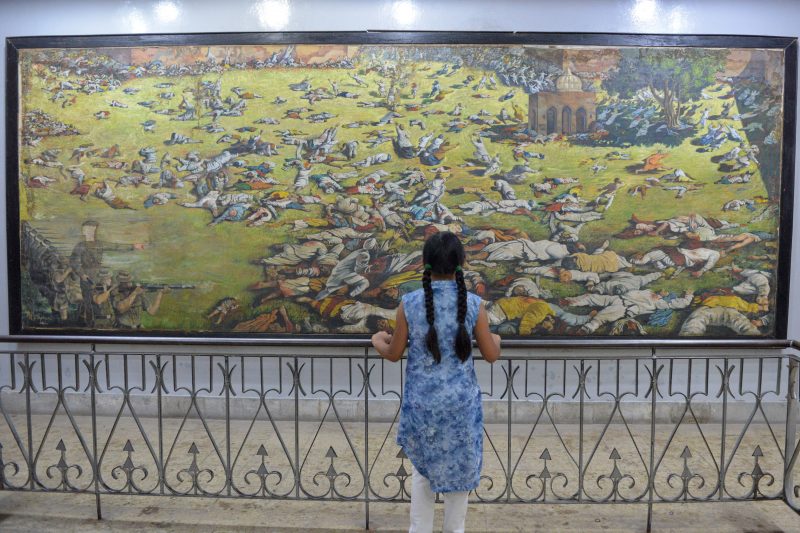UK should apologise for century-old Amritsar massacre, India says
An Indian girl looks at a depiction of the massacre by British troops at Jallianwalah Bagh in Amritsar ahead of its 100th anniversary (NARINDER NANU)
New Delhi (AFP) – Britain should apologise for the killing of unarmed Indian civilians in the city of Amritsar, India’s defence minister told AFP on Tuesday days before its 100th anniversary — and for the 1943 Bengal famine too.
The April 13, 1919 Jallianwala Bagh massacre, in which British troops opened fire on thousands of unarmed protesters, remains an enduring scar of British colonial rule in India.
Colonial-era records show about 400 people died when soldiers opened fire on men, women and children in an enclosed area, but Indian figures put the toll at closer to 1,000.
Former British prime minister David Cameron described it as “deeply shameful” in a visit to the northern Indian city in 2013 but stopped short of an apology.
In 1997, Queen Elizabeth II laid a wreath at the site but her gaffe-prone husband Prince Philip stole the headlines by reportedly saying that Indian estimates for the death count were “vastly exaggerated”.
Nirmala Sitharaman, India’s defence minister, told AFP ahead of the 100th anniversary on Saturday that now was the time for Britain to say sorry.
“Without a doubt, yes,” Sitharaman said. “There couldn’t have been a bitterer tragedy during the freedom movement in India…. That was an inhuman act.”
Arguments that apologising would leave London open to legal claims “could be no legitimate reason to say I shall not regret this. That’s the baggage you have to carry with you.”
Sitharaman also said that Britain should also say sorry for a lesser-known but much bigger tragedy — the Bengal famine in eastern India during World War II.
As many as three million people died in 1943 after Japan captured neighbouring Burma — a major source of rice imports — and British colonial rulers in India stockpiled food for soldiers and war workers.
“Three million people, they starved to death… Britain owes an apology for that,” she said.
“That was a man-made diaster. Grains of Bengal, from all parts of India, were all diverted for the war, depleting the people’s basic needs.”
Sitharaman added that the chaos over Brexit was “really sad”.
“It is a situation in which no country would ever want to be in, because it is an unenviable position. You have thrown yourself into an area about which you have no clue.”
Disclaimer: Validity of the above story is for 7 Days from original date of publishing. Source: AFP.


